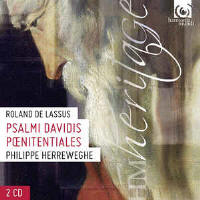Texte paru dans: / Appeared in: |
|
|
Outil de traduction |
|
|
|
|
|
Reviewer: J.
F. Weber
One of the most celebrated
works of Orlandus Lassus (1532-1594) is the set of the seven penitential
psalms that Duke Albrecht commissioned soon after the composer arrived at
the court of Munich in 1556. The duke had them copied for his private use
into a sumptuous manuscript between 1563 and 1571, illuminated by Hans
Mielich. The printed edition appeared only in 1584, five years after the
duke's death. In this long interval, Lassus regretted his inability to
publish this and other major works that could have enhanced his reputation
while he was still in his twenties. A modern edition was published as early
as 1838, but the editor of the collected works still has not prepared it
yet. This is the fourth complete recording, following the Aachen Cathedral
Choir, the Hilliard Ensemble, and Henry's Eight (22:1); a recent set by the
Tölzer Knabenchor has not yet arrived. This version uses 14 singers
unaccompanied; Henry's Eight used eight unaccompanied singers; the Hilliards
used from six to 10 singers, with the Kees Boeke Consort in all but two
psalms; the Tölz choir also adds instruments. Only Henry's Eight includes
the two Laudate psalms (148 and 150 joined together) that were added to the
1584 print to complete the series of eight modes, another 11 minutes of
music.
The choirs from Aachen and
Tölz (like Christ Church Cathedral below) are made up of boys and men, while
Hilliard and Henry's Eight are men's ensembles with countertenors on top.
Hence, this is the first complete set to offer mixed voices (as does the
Josquin des Prez ensemble, but without the big choral sound of the Czech
chorus, both below). The music of Lassus, unlike his nearest great
contemporaries, Palestrina and Victoria, is sometimes recorded with
instruments (only one-fourth of his mass recordings are accompanied), as are
some of these issues. A prominent source of information on performance
practice is two full-page paintings in that same manuscript of these psalms.
One shows the court cappella with singers and instruments (fol. 187), the
other a chapel choir devoid of them (fol. 186). These full-page miniatures
have often been reproduced in color on record sleeves, and they are included
in this booklet. It has been argued, as the notes for the Hilliard discs do,
that the psalms, the duke's musica reservata, would have been performed in
the court, but that is mere speculation. They would have been more
appropriately sung in chapel on penitential occasions that excluded
instruments (Lent, Office of the Dead). Among a number of recordings of less than the complete set, Ensemble Josquin des Prez sang Psalms Nos. 6, 37, 129, and 142 unaccompanied on Raumklang RK 9606. The Czech Philharmonic Chorus sang Psalms Nos. 6, 101, and 142 (18:4), omitting No. 37 that they had included on the LP. The former were almost as fast as the old Aachen set, while the latter were among the slowest versions, only exceeded in length by the three psalms that Christ Church Cathedral choir recorded under Simon Preston and Stephen Darlington. The shortest psalm, Ps. 129, has been recorded separately at least a dozen times. Herreweghe's adult mixed voices are admittedly not the ensemble Lassus would have used, but the performances are so exquisite that they can be recommended with enthusiasm. He begins with a tempo in Ps. 6 that is very close to the slowest on record (Josef Veselka), followed by two psalms in moderate tempos, then Ps. 50 close to the slowest (Bruno Turner), concluding with three psalms that again fall in the middle of the alternatives. The entire set is immensely satisfying to the ear. The packaging is a very practical and durable digipack. Even if we include Tölz, the four complete sets on CD use four different groups of performers, so they are not directly competitive. I will opt for Herreweghe for now.
| |
|
|
|
|
|
|
|
|
|
|
Cliquez l'un ou l'autre
bouton pour découvrir bien d'autres critiques de CD |
|



